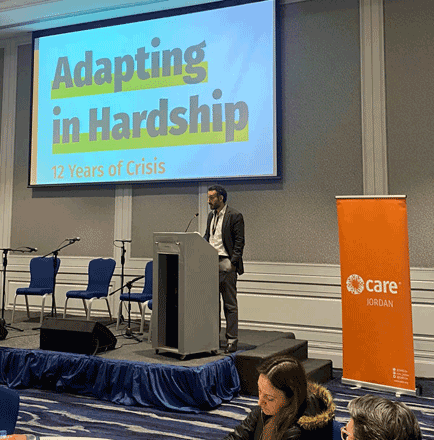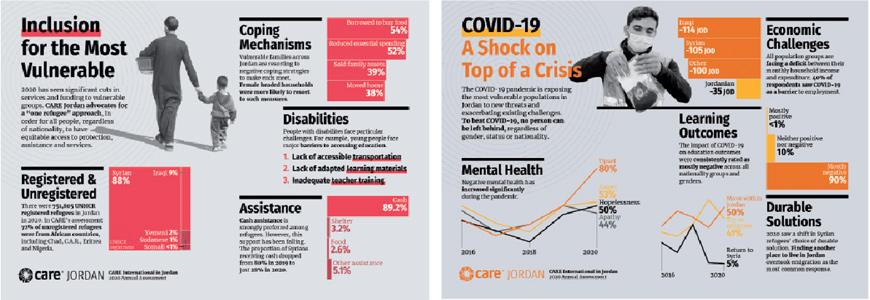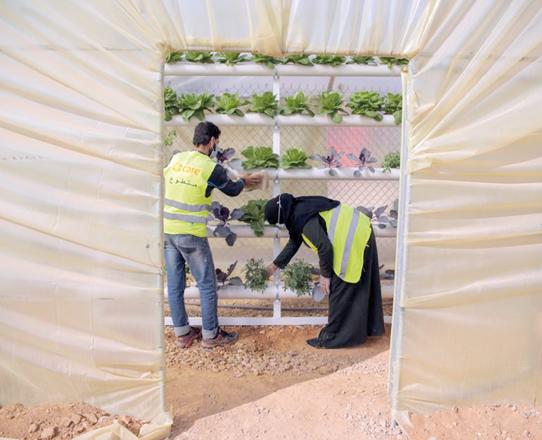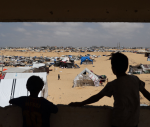You are here
Economic pressure ‘exasperates’ inequalities among vulnerable communities — CARE report
By Mays Ibrahim Mustafa - Feb 14,2023 - Last updated at Feb 14,2023

Country Director of CARE International Jordan Ammar Abu Zayyad speaks during the launch of 2022 ‘CARE Jordan Annual Needs Assessment’ in Amman on Tuesday (Photo courtesy of CARE International)
AMMAN — Jordan’s most vulnerable communities are faced by “great economic pressure” in the post-pandemic period, which has “exasperated existing inequalities among those most at risk”, according to CARE International in Jordan.
The global relief agency launched its 2022 “CARE Jordan Annual Needs Assessment” on Tuesday in the presence of the organisation’s partners, including local and international humanitarian agencies as well as embassies.
According to its website, the assessment aims “to identify, analyse and track the needs, vulnerabilities, and coping mechanisms of host communities and refugees in Jordan” to help CARE and other humanitarian actors better address their needs.
It revealed that roughly 43 per cent of surveyed households reported some form of violence in 2022, compared with 22 per cent in 2021, and 36 per cent of respondents reported that they felt unsafe due to discrimination in 2022, compared with 33 per cent in 2021.
“The reported incidence of economic violence — defined as controlling an individual’s financial resources, employment or school opportunities in attempt to make them financially dependent — increased from 10 to 22 per cent of households from 2021 to 2022,” the report stated.
It added that 31.4 per cent of respondents were unemployed, 51 per cent said “that they have no secondary source of income” and 17 per cent were “relying on borrowing money from informal lenders as a secondary income source”.
Moreover, the assessment found that, although mental health and wellbeing have improved since the onset of the COVID-19 pandemic, “anxieties related to anger and stresses due to economic pressure were particularly common”.
It also highlighted gaps in services provided to persons with disabilities and older people, as “less than 9 per cent of participants in Amman, less than 7 per cent in Irbid, 4 per cent in Mafraq and 5 per cent in Zarqa reported” such services being available.
Additionally, the assessment showed that roughly 32 per cent of boys and 30 per cent of girls in the 2,540 surveyed households do not attend school. It noted that “refugee children continue to be more likely to be behind in school than their Jordanian counterparts”.
“Only 57 per cent of Iraqi students, 48 per cent of Syrian students, and 54 per cent of other nationality refugee students are in the education level appropriate for their age group — compared with 90 per cent of Jordanians,” according to the report.
It also marked an increase in reliance on negative coping strategies within vulnerable communities, such as removing children from school to work, due to rising costs of living. According to the study, 88 per cent of respondents are in debt.
“Average monthly expenditure in a Syrian household on food, for example, has risen by 11 per cent from 2021 to 2022. Moreover, Jordanians pay an additional 10 per cent for housing and utilities on average in 2022 compared to 2021,” it stated, adding that “families’ dependency on humanitarian assistance is becoming more pronounced over time”.
Jordanian respondents who “listed cash assistance from humanitarian actors as their primary income source” increased from 17 per cent 2020 to 30 per cent in 2022, and “Syrian refugees’ reliance on cash assistance” rose from 16 per cent in 2020 to 42 per cent in 2022, according to the assessment.
However, the report highlighted that Jordan saw “small gains in gender equality”, even though women are still “far less likely to be engaged in the paid workforce than men”.
It revealed that respondents’ agreement with the statement: “It is shameful for the family when women have to work” has decreased from 14 per cent in 2020 to 11 per cent and 9 per cent in 2021 and 2022, respectively.
Additionally, CARE’s report showed that respondents from refugee and host communities are “affected” and “concerned” by climate change.
It stated that Jordan ranks 68 out of 181 countries on the Climate Change Vulnerability index. “It faces several climate-related shocks and stressors, including significant temperature increases, rainfall decline, and increased incidents of drought”.
The report revealed that 48 per cent of all respondents reported that “climate change has negatively impacted their household income”.
During the launch event, Norwegian Ambassador to Jordan Espen Lindbæck said that Jordan’s hospitality towards “those fleeing from conflict in the region has truly been both humbling and impressive”.
However, new crises which have emerged elsewhere in the world are “putting a strain” on the resources available to support the Kingdom’s humanitarian response efforts, he said.
“Finding new, innovative, effective and integrated ways to support Jordan’s hospitality is now imperative,” he added, noting that responding to humanitarian crises and emergencies is a “core priority” within Norway’s foreign policy.
The country director of CARE International Jordan, Ammar Abu Zayyad, said that it is important to recognise Jordan’s efforts in hosting various refugee populations.
He also stressed CARE’s commitment to an “inclusive and equitable response” by pursuing sustainable solutions that support long-term developmental plans to ensure that “no key issues are overlooked and no communities are pushed into marginalisation”.
Related Articles
AMMAN — The COVID-19 pandemic has had a profound impact on Jordan’s most vulnerable population during 2020 and has exposed them to new chall
Half-a-million Syrian refugees living in urban areas in Jordan are struggling more than ever to cope with inadequate housing, high debts, rising living costs and educational challenges for their children, according to a recent study.
AMMAN — As the COVID-19 pandemic enters its third year, debt, unemployment and the fear of homelessness are exacerbating domestic violence a
















